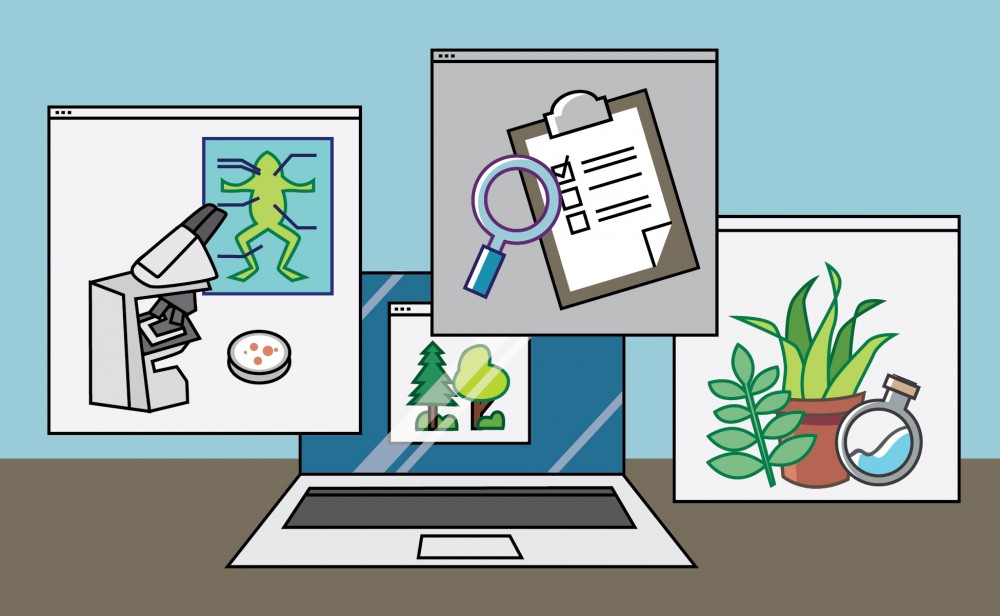Faculty from the University of Minnesota’s College of Biological Sciences are working to fill the demand for online biology classes.
They are creating the Center for Online Biology Education, which would include a website that features all available CBS online classes. Faculty said they hope to launch the website by the end of fall semester. The center also includes faculty resources and a mentorship program for instructors looking to teach an online class.
“The goal of COBE is really to provide a centralized location for all of CBS faculty,” said Charles Willis, assistant professor in the Department of Biology Teaching and Learning.
CBS faculty want to expand the amount of online biology classes they can offer, he said. In order to do that they need to equip faculty with knowledge about how to teach online biology classes.
Online classes require consideration for how to provide feedback, how to teach effectively over an online platform and require management daily, Willis said.
“All of that is different and can be daunting for a faculty member to come into an online course,” he said.
The mentorship program’s goal is after the instructors spend a semester shadowing another instructor, faculty will spend the next semester co-teaching an online class with them, he said. Eventually, the faculty members may be able to create their own new class or a new online section of an existing course.
An online format can be difficult for biology students, Willis said.
“One of the challenges with online learning for students is self-direction. You have to be, to some degree, your own instructor,” he said. “We have tools to remind students online, but they have to, in a much more personal way, organize their schedule.”
They’re learning ways to use Canvas in a way that students aren’t as overwhelmed with the platform’s capabilities, he said.
Kalli Binkowski, the academic technology coordinator in CBS, has worked behind the scenes managing technology for COBE. She’s seen how different teaching online can be, she said.
“You do not realize how much information you convey being physically in a classroom with students. And we’re not just talking about lecturing or whatever, but all those little moments,” Binkowski said.
Times where they’ve been reminded to complete an assignment, where they’ve been able to get extra help or an individual explanation from the instructor are important, she said.
“Imagine going to lab and not having a TA there to help you through it,” Binkowski said. “All of that has to be done through the computer.”
Communication is key, she said. Online instructors communicate with students a lot more than expected, through emails and weekly announcements.
Another component is facilitating a community, Binkowski said.
“Students will be much more successful in an online class if there’s a sense of community, belonging and people being there,” she said.
When instructors reach out to students through video, it can make the course more human for students, Binkowski said.
“I have a lot of instructors who hate being on video, and it’s the quickest, easiest way to be a human for students,” she said.
Alongside creating groups for students and having them work together to solve problems, all of these elements can make for a more successful online class experience, Binkowski said.
In some of CBS’s classes with larger enrollment, there’s already a demand for more online classes, said David Kirkpatrick, an associate professor and head of Biology Teaching and Learning.
“That means we also have to identify the right instructors for [them],” he said. It has to be attractive to the University population.
One of the core missions is to develop best practices, Kirkpatrick said.
“I see COBE as a means to do something like that with online biology education. It’s a good framework for starting to actually do research into what works in the online space and what doesn’t,” he said.
Not a lot of research for online biology education exists, Kirkpatrick said.
The department wants an active research program where they can begin submitting research grants, Willis said. This program could eventually involve students.
“I think [COBE’s] one of these things that the college needs to be doing to keep contemporary and be forward looking,” Kirkpatrick said. “I don’t see a downside to doing it.”







